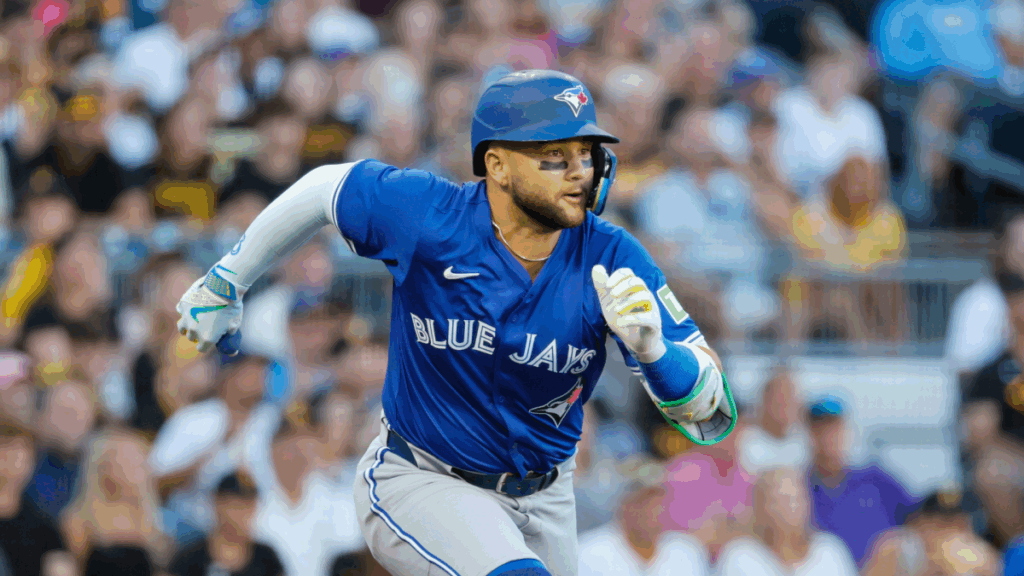While the Los Angeles Dodgers and Toronto Blue Jays continue to duke it out in the 2025 World Series, the rest of Major League Baseball is planning for the offseason to come. In some places, that means paying special attention to Toronto infielder Bo Bichette, one of the winter’s top potential free agents.
Bichette, 27, was recently ranked by CBS Sports as the third-best player in the class, behind Chicago Cubs outfielder Kyle Tucker and Boston Red Sox third baseman Alex Bregman. Here’s what we wrote:
Bichette’s optimal position is second base, but his bat may convince a team to tolerate his substandard play at short for a few more years yet. He rebounded from a down season by clearing a .290 average (for the fourth time in five tries) and 60 extra-base hits (for the third time). Bichette’s flat swing allows him to wear out elevated pitches, with his .337 average on offerings located in the upper half ranking fifth among qualifiers. As an added bonus, he’s on the younger side for a free agent (he’ll turn 28 in March).
While Bichette is still focused on the World Series (his team tied the series with a Game 4 win Tuesday night), the conversation around him is just as focused on the offseason. What’s the book on him, good and bad? And just where might he land, and for how much? Below, CBS Sports has compiled a buyer’s guide, of sorts, to one of the winter’s most interesting free-agent cases.
1. Strengths
There’s never a surefire way to predict how much a player is impacted by this or that injury. Still, it seems more safe than not to write off Bichette’s 2024 as a result of the repeated calf issues and a fractured finger he suffered. That’s because of his youth (he’ll turn 28 in March) and his track record.
To wit, Bichette has produced at a level 20% or better than the league-average hitter in four of his five full seasons. (He also cleared that mark in both of his partial seasons, 2019 and 2020.) Since becoming a full-time fixture in 2021, Bichette ranks eighth among active middle infielders (min. 2,000 plate appearances) in OPS+, behind names like Corey Seager, Mookie Betts, and Bobby Witt Jr.
Bichette is highly skilled at putting the barrel on the ball. He was one of four qualified batters in the 90-90 club — that is, 90 mph average exit velocity and 90% in-zone contact rate. Bichette’s swing features a flat attack angle, allowing him to get on top of pitches up in the zone. He’s an all-fields hitter, too, spraying at least 25% of his batted balls to left, center, and right.
Bichette’s game isn’t based on power. He doesn’t prioritize pulling and lifting the ball or anything like that, but he has averaged 24 home runs and 41 doubles per 162 games. Those numbers may slip in a less-generous offensive environent. All the same, Bichette ought to remain a quality batter who can slot in as a prototypical No. 2 hitter if his new team so desires.
2. Weaknesses
Bichette’s biggest flaw is his shortstop defense. He’s always struggled on plays that require him to charge in, and this season those woes have extended to whenever he’s asked to range in either lateral direction. He also has below-average arm strength; though that tends to be overvalued publicly, it may rule out a move to the hot corner. Bichette’s exposure to second base in the postseason — the first of his big-league career — has been in response to his knee injury, but he’s probably heading that way on a permanent basis sooner than later. Of course, the state of the shortstop position could persuade some teams to tolerate his substandard glove if it means adding his bat to the lineup.
The other notable flaw in Bichette’s game is his approach. His 6.4% walk rate this season represented his highest since 2019, when he appeared in 49 games. Bichette has always offered at more than 53% of the pitches he’s seen in a season, and he’s not inherently picky about whether or not they’re within the zone. Indeed, this season he ranked in the 12th percentile in chase rate. He must maintain a high rate of contact, ideally quality contact, in order to remain productive with such swing-happy tendencies.
It’s fair to point out too that Bichette hasn’t appeared in 150 or more games in a season since 2022. He’s required time on the shelf for soft-tissue injuries involving both knees, a calf, and a quad. Generally, teams have more concern about that subset of injuries than if a player misses time because of a broken bone, with the latter often being easier to regard as a fluke incident.


3. Contract prediction
While contractual terms may feel channeled from another dimension, you can make some good guesses by taking precedent and adjusting for inflation and other factors.
In Bichette’s case, there are no shortage of recent contracts inked by shortstops in their late 20s. Two in particular feel relevant here: the seven-year, $177 million pact Dansby Swanson signed with the Chicago Cubs in December 2022, and the seven-year, $182 million agreement Willy Adames reached last winter with the San Francisco Giants.
In both cases, you’re talking about a lengthy agreement that paid between $25 million and $26 million annually. Bichette’s defense may cause some teams to take pause, but it’s probably fair to assume that he’ll find a suitor willing to fork over something like seven years, $189 million.
4. Potential suitors
The Blue Jays are the most obvious landing spot for Bichette. They’re the only team he’s ever suited up for and they expressed interest in signing him to an extension back in the spring. Perhaps being fresh off a World Series appearance — and the windfall that comes with it — will help the two sides find enough common ground to reach a new, long-term arrangement.
Should Bichette reach free agency, it’s worth wondering if old Blue Jays boss Alex Anthopoulos, now at the helm with the Braves, would be willing to overlook his defensive limitations and install him at short. Atlanta’s plausible interest could hinge on if Ha-Seong Kim opts out of his contract, however. Elsewhere, the Los Angeles Angels are also managed generally by Perry Minasian, a scout with the Blue Jays when they drafted Bichette. That doesn’t guarantee interest, but the Angels could use the help if they want to return to the postseason. Pairing Bichette with Zach Neto would make for a strong double-play combination.
Beyond those clubs, the teams who received the least production from shortstop this season either have a strong internal candidate (Detroit Tigers), probably won’t spend the money (Cleveland Guardians, Milwaukee Brewers), or may have hang-ups about the defense (New York Yankees).


